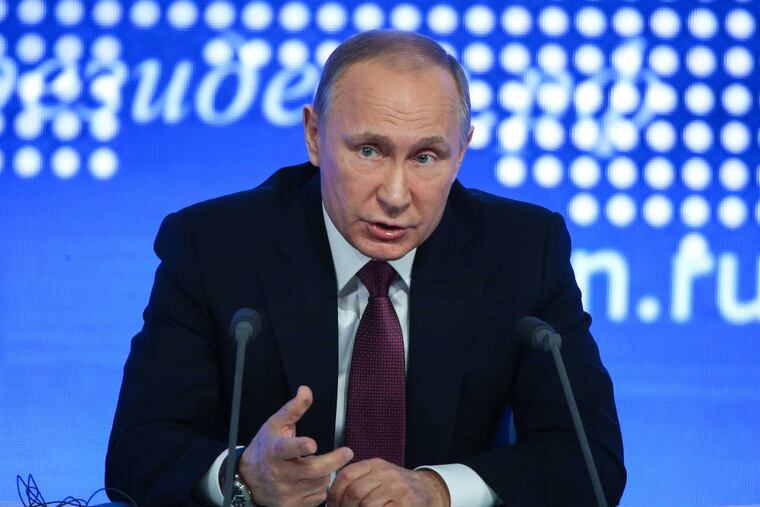Weak human-rights stance here hurts LGBT people worldwide
Trump avoids drawing attention to human-rights concerns in countries where he wants to build trade relationships, even when their records are particularly dangerous for LGBT populations.

As Pride Month came to a close last week, many commented that this year there was a tension in the air alongside the usual celebratory atmosphere. The presidency of Donald Trump has been marked by increasingly intolerant rhetoric. While he has not directly targeted gays, some worry that we might be next.
The concerns of the American LGBT population are legitimate. But LGBT people around the world have a lot more to worry about in the Trump era. The president's retreat from supporting human rights could have grave consequences for LGBT populations already facing discrimination and violence.
Yes, developments in the United States are concerning. Virginia's Gavin Grimm fights in vain for his right to use the school bathroom. Anti-LGBT hate crimes continue to rise, and Texas, Alabama, and South Dakota have restricted gay adoption, citing "religious freedom" for agencies that deny services to gay parents. Republicans in Congress show little interest in a bill providing nationwide nondiscrimination measures for LGBT people.
But the current political climate is much more dangerous for the LGBT population in other countries. In many countries, they face harassment, indiscriminate arrests, torture, and even death. With colleagues at Columbia University, we have conducted online surveys and Skype interviews with hundreds of LGBT activists globally.
Many politicians around the world either claim that there are no LGBT people in their countries, or that "homosexuality is against our culture" - and therefore gays do not deserve rights. When we asked our interviewees how they fought for rights in such hostile contexts, many spoke of reminding their governments about human-rights agreements they had signed.
These activists are not asking for gay marriage or adoption. They are asking for basic rights, such as freedom of assembly, and freedom from extrajudicial detention and torture. At the most basic level, many are fighting for the right to live.
Trump's backpedaling from human-rights agreements is particularly troubling to such vulnerable populations. Trump has reduced both financial and ideological support for human rights, and his budget cuts indicate a massive withdrawal from foreign development funding. These cuts endanger work by the State Department and the United Nations to promote global human rights.
Trump also avoids drawing attention to human-rights concerns in countries where he wants to build trade relationships, even when the records of his friends are particularly dangerous for LGBT populations.
Take Trump's relationship with Vladimir Putin. Life is grim for LGBT people in Russia. A 2013 law prohibits the distribution of "propaganda" that encourages "alternative lifestyles" over "traditional" heterosexual family values. This law inspired neonationalist groups to publicly torture their LGBT neighbors.
In March and April, the government of Chechnya, a federal subject of Russia, arbitrarily arrested more than a hundred members of the gay community; many have been tortured and even killed. Putin does not seem to notice.
In our interviews, LGBT activists consistently used human-rights rationales to justify their activities. When politicians and religious leaders consistently say that homosexuality is against their culture and religion, activists emphasize that LGBT people are human and thereby deserve human rights. One sub-Saharan African activist noted, "human rights and LGBT rights aren't just related. They are the same thing."
And when human rights are weak, this disproportionately affects LGBT peoples. Another African activist explained a recent law that limits freedom of assembly. In his country, a police permit is required for any gathering of more than five people. However, police only enforce this law (and make arrests) when LGBTs gather.
Many NGOs gain more support when they tie their activities to human rights. One Mideast activist described his country's first gay film festival as a triumph. "When we use the veil of human rights, it becomes pretty much acceptable. We successfully have police security, engagement of government, and the ministry of human rights every year."
In 2011, Secretary of State Hillary Clinton noted, "Gay rights are human rights, and human rights are gay rights." The second half of that statement usefully emphasizes that human rights are particularly important for vulnerable populations. When basic human rights are upheld, LGBTs will be much safer.
While gay rights in the United States may seem tenuous, we still have the right to marry, serve our country, and receive basic protections from our government. Yes, we need to be vigilant in protecting these rights, and keep an eye out for gradual infringements. But Trump - and his weak stance on basic human rights - is far more dangerous for LGBTs around the world.
Naomi A. Moland will join the faculty at the School of International Service at American University this fall. naomi.moland@nyu.edu
Melissa Mott is a recent master's graduate from Teachers College-Columbia University. melissa.mtt@gmail.com